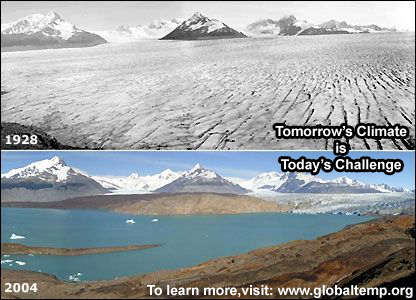Key facts

This section is to help those who struggle to convince friends and family that climate change does exist, and provides some evidence to help make your case more persuasive:
 Big changes in the atmosphere since the Industrial Revolution, just 200 years ago, the amount of CO2 in the atmosphere has increased by 30%. Concentrations greenhouse gas emissions are now higher than at any point in the past 800,000 years.
Big changes in the atmosphere since the Industrial Revolution, just 200 years ago, the amount of CO2 in the atmosphere has increased by 30%. Concentrations greenhouse gas emissions are now higher than at any point in the past 800,000 years.
 Global temperature warming average temperatures have risen by almost a degree in the last century. A further increase by 1ēC will lead to a 10-15% increase in rainfall, and higher temperatures leading to drought, water shortages and forest fires.
Global temperature warming average temperatures have risen by almost a degree in the last century. A further increase by 1ēC will lead to a 10-15% increase in rainfall, and higher temperatures leading to drought, water shortages and forest fires.
 Hot decade ten of the warmest years on record have happened since 1990, six of these since 1995. The heat wave of August 2003, which swept across Europe, killed over 2000 people in the UK alone and was probably the hottest for at least 500 years.
Hot decade ten of the warmest years on record have happened since 1990, six of these since 1995. The heat wave of August 2003, which swept across Europe, killed over 2000 people in the UK alone and was probably the hottest for at least 500 years.
 Big increase in flood victims the autumn and winter floods of 2000 in the UK were the worst for 270 years in some areas. Flooding on farmland cost the farming industry nearly Ŗ500 million.
Big increase in flood victims the autumn and winter floods of 2000 in the UK were the worst for 270 years in some areas. Flooding on farmland cost the farming industry nearly Ŗ500 million.
Our Economy

Some economists have tried to estimate the aggregate net economic costs of damages from climate change across the globe. Such estimates have so far failed to reach conclusive findings; in a survey of 100 estimates, the values ran from US$-10 per tonne of carbon (tC) (US$-3 per tonne of carbon dioxide) up to US$350/tC (US$95 per tonne of carbon dioxide), with a mean of US$43 per tonne of carbon (US$12 per tonne of carbon dioxide).
One widely publicized report on potential economic impact is the Stern Review; it suggests that extreme weather might reduce global gross domestic product by up to 1%, and that in a worst-case scenario global per capita consumption could fall 20%.
The report's methodology, advocacy and conclusions have been criticized by many economists, primarily around the Review's assumptions of discounting and its choices of scenarios, while others have supported the general attempt to quantify economic risk, even if not the specific numbers.
In a summary of economic cost associated with climate change, the United Nations Environment Programme (UNEP) emphasizes the risks to insurers, reinsurers, and banks of increasingly traumatic and costly weather events. Other economic sectors likely to face difficulties related to climate change include agriculture and transport. Developing countries dependent upon agriculture will be particularly harmed by global warming.


